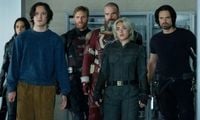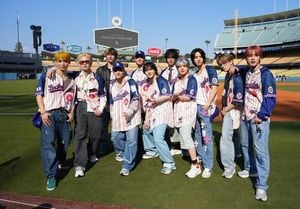As Marvel Studios gears up for the release of Thunderbolts on May 2, 2025, fans are buzzing about a curious detail in the title: the asterisk. While it might seem like a simple typographical flourish at first glance, in the Marvel Cinematic Universe (MCU), even the smallest symbols are rarely without meaning. The asterisk in Thunderbolts serves as more than just a stylistic choice; it hints at a major identity crisis at the heart of the film.
The movie follows a ragtag group of morally grey characters stepping into the shoes of Earth’s former mightiest heroes. As a Japanese poster for the film bluntly states: “The Avengers are not available.” This sentiment is echoed in the film’s trailer, where Valentina Allegra de Fontaine, played by Julia Louis-Dreyfus, coldly notes: “The Avengers are not coming.” According to Variety, the asterisk serves a dual purpose, acting as both a tongue-in-cheek disclaimer and a commentary on this new team’s shaky status. They aren’t the Avengers, but they’re filling in—sort of.
The symbol becomes a narrative wink to the audience: these are not your typical heroes, and this isn’t your typical Avengers replacement. For a while, fans theorized that the asterisk referenced Thaddeus Thunderbolt Ross, a character played by Harrison Ford, who will soon appear as Red Hulk in Captain America: Brave New World. However, Marvel Studios has clarified that the team’s name is unrelated to Ross, whose checkered military history makes him an unsuitable figurehead for a team trying to walk the line between redemption and chaos.
Marvel boss Kevin Feige has teased that the meaning of the asterisk won’t be fully understood until audiences see the film, especially its post-credits scene. That moment reportedly hints at the group’s eventual rebranding to the New Avengers, setting the stage for Avengers: Doomsday in 2026. Whether the audience embraces them under this new banner remains to be seen.
Interestingly, while the original Thunderbolts in Marvel Comics were villains in disguise, the MCU iteration is more focused on redemption and complexity. With characters like Yelena Belova, Ghost, and even Bucky Barnes navigating their own troubled pasts, the asterisk could also signify the moral asterisk beside each team member’s name—a reminder that heroism in the MCU is rarely black and white.
The film introduces Yelena Belova, played by Florence Pugh, who is ready to leave her assassin life behind. CIA Director Valentina Allegra de Fontaine is under Congressional investigation, creating a backdrop of tension as Yelena teams up with John Walker (Wyatt Russell), Taskmaster (Olga Kurylenko), and Ava Starr (Hannah John-Kamen). Alongside them are Alexei/Red Guardian (David Harbour) and Bucky Barnes (Sebastian Stan), forming an unlikely team caught in a web of intrigue.
Despite the film’s two-hour and six-minute runtime, it attempts to weave together a complex narrative filled with backstories and character dynamics. The movie’s writers, Eric Pearson and Joanna Calo, along with director Jake Schreier, have crafted a story that feels both fresh and engaging. However, the film does rush through the bulk of the characters’ histories, leaving some, like Ava, feeling underdeveloped.
Nevertheless, the film offers a lighthearted tone that contrasts sharply with more serious recent MCU projects like Daredevil: Born Again and Captain America: Brave New World. Schreier’s direction keeps the action clean and easy to follow, especially during intense sequences like the first confrontation among the ensemble.
Florence Pugh stands out as the film’s emotional and moral center, with her character Yelena creating bonds with her teammates, from her tricky relationship with Alexei to her budding friendship with Bob (Lewis Pullman). Pugh and Pullman share remarkable chemistry, which could be a promising foundation for future Marvel narratives.
While Bucky Barnes’ character takes a backseat for much of the film, his transition from assassin to Congressman adds an intriguing layer. This plot development, first introduced in Brave New World, raises questions about its relevance and impact on future MCU storylines.
David Harbour brings infectious energy to his role as Alexei, while Julia Louis-Dreyfus excels as Valentina, a comic book villain driven by self-interest. Unlike typical Marvel foes, Valentina’s motivations are complex, making her a more relatable character.
The film’s narrative reflects a broader theme within the MCU, showcasing a society struggling to move on from the absence of iconic heroes like Tony Stark and Steve Rogers. This void parallels the current state of the MCU, which is pivoting towards new narratives while still grappling with the legacy of its past characters.
As Marvel prepares for the release of Thunderbolts, the emphasis on unique, likable characters serves as a reminder of what has made these films successful. The Avengers didn’t make over a billion dollars in 2012 merely because they were superheroes; it was the relatable moments, like the post-battle schwarma scene, that resonated with audiences.
Ultimately, Thunderbolts aims to remind viewers that heroism can come from unexpected places and that anyone can step up when the world needs them. As the film prepares to hit theaters, fans are eager to see how this new team of misfits will navigate their journey and what the future holds for them in the MCU.
With the release just around the corner, audiences will soon discover the deeper meanings behind the asterisk in the title and how it shapes the narrative of Thunderbolts*. The film promises to deliver a mix of action, humor, and emotional depth, setting the stage for an exciting new chapter in the Marvel Cinematic Universe.




